By JULIE MINDA
Pandemic-related shutdowns have dealt a powerful blow to the U.S. workforce. Unemployment hit its highest point since the Great Depression.
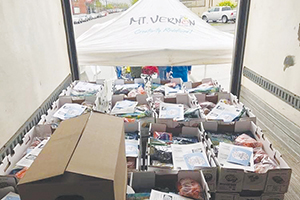
SSM Health and its community partners started the monthly "Mobile Market" in Mount Vernon, Illinois, to distribute boxes of produce and dairy to people who are experiencing food insecurity during the COVID-related economic downturn. The University of Illinois Extension, the United Way of South Central Illinois and the U.S. Department of Agriculture partner in the effort.
Several ministry community benefit leaders say they began seeing an immediate toll from the economic downturn in March and April with long lines at food banks. The certainty of community spread and asymptomatic transmission underscored longstanding issues of housing insecurity and overcrowding.
"We have been watching society's safety net unravel, and it is disturbing and alarming, and the numbers are unprecedented," when it comes to unemployment counts and similar measures of community impact, says Michael Miller, system vice president of mission and ethics for St. Louis-based SSM Health. He says SSM Health has been working with its community partners amid the pandemic to help ensure that families in need have access to food, shelter and other basics.

Miller
Partner support
The community benefit leaders who spoke to Catholic Health World say much of their systems' work to address acute economic disparities is grounded in partnerships with numerous community organizations. These include public health agencies and nonprofit providers of food, housing, transportation and other aid.
Shortly after the pandemic shut down much of the U.S. economy, community benefit leaders say, their departments got in touch with their local partners to assess how they'd been impacted and to determine what was needed in terms of the ministry systems' funding to keep those organizations viable in the near term.
Miller says in March SSM Health community benefit staff sent partner organizations a brief survey on their immediate needs. The responses helped community benefit staff understand what was happening in the neighborhoods, so they could adjust in a way that supported the partners doing frontline work and respond with urgency to the needs of the underserved.
In many cases, SSM Health allowed the community organizations to temporarily halt grant-funded programming and to instead use SSM Health funding for COVID responses, such as for converting walk-in food pantries to drive-thrus.
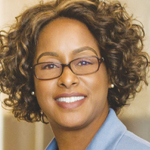
Abrams
At the Irving, Texas-based CHRISTUS Health system, Chara Abrams is director of mission integration and community benefit and Marcos Pesquera is system vice president of health equity, diversity and inclusion. Abrams says at the onset of the pandemic CHRISTUS Health also reached out to its community partners to determine how best to help them. Pesquera says CHRISTUS Health gave broad leeway to the partners, enabling them to use funds in ways that were outside of contractually established parameters of their relationships.
For instance, community benefit staff in the system's Santa Fe, New Mexico, and San Antonio regions offered their partner organizations the leeway to divert preexisting grant funds to pressing needs, such as the purchase of personal protective equipment or technology assistance to transition to virtually provided services.
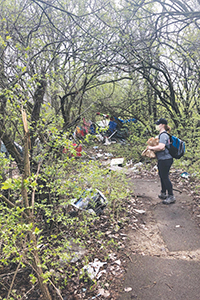
Jalee Helmuth, a nurse with the Mount Carmel Health System's street medicine program, brings lunch and medical supplies to a homeless encampment in Columbus, Ohio. The outreach allowed homeless individuals to follow stay-at-home orders issued by the governor earlier this year to combat coronavirus contagion. The street medicine program is part of Mount Carmel's community benefit work.
Jesse Cirolia, manager of community health at CHRISTUS St. Vincent, says the health system formed a funding alliance including CHRISTUS St. Vincent, Anchorum St. Vincent and the Santa Fe Community Foundation to reduce duplicative funding processes. Nonprofit organizations dedicated to addressing the social determinants of health were able to apply for funds from all three funding organizations under the umbrella alliance organization, using one simple form, and receive the support they needed to continue providing essential services. Nonprofits have played a critical role in helping to provide necessary supports throughout the COVID-19 pandemic, Cirolia says, adding that simplifying the funding process and working with organizations to build capacity is strengthening the safety net programs in northern New Mexico communities.
Nimble staff
Ministry sites also reconfigured their own staff activity, resources and approaches to respond to emerging community needs.
Adjustments at CHRISTUS Health included expanding the outreach of case managers and community health workers with its Equity of Care initiative. Prior to the pandemic, those case managers had contacted patients with hypertension to help them with care follow-up and with addressing socioeconomic needs. After the pandemic began, the case managers did similar intervention with uninsured COVID patients quarantined and isolated at home.
Abrams says CHRISTUS Health's community benefit department is making sure that COVID information disseminated to the public is accessible in multiple languages and that interpreters are available to patients.
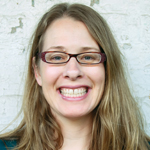
Dircksen
Jaime Dircksen, vice president of Community Health and Well-Being at Livonia, Michigan-based Trinity Health, says because of COVID precautions, frontline community health workers who were used to making in-person visits to community members in need instead contacted them by telephone.
Nearly all of Trinity Health's ministries established social care hubs during COVID, staffing them in part with reassigned community health workers. Callers get referred to Trinity Health or partner organizations that can address their socioeconomic needs. Most Trinity Health ministries also have COVID nurse triage lines, and about one-third of those nurse lines have a direct connection to the social care help lines.
Dircksen says the nurse triage lines and social care hubs are particularly valuable to the many people who are newly unemployed in Trinity Health markets.
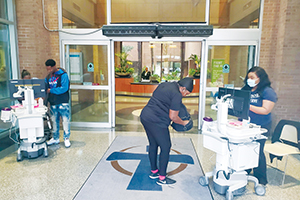
Community health workers ask visitors health status questions and take their temperatures before "badging" them at Our Lady of the Lake Regional Medical Center in Baton Rouge, Louisiana. The photo was taken in March. The governor issued a mandatory mask order in July.
Coletta Barrett is vice president of mission for Our Lady of the Lake Regional Medical Center, part of Baton Rouge, Louisiana-based Franciscan Missionaries of Our Lady Health System. She says that system redeployed its community health workers — including many who work in its school-based health center program — to administer COVID tests. They worked at a shuttered Baton Rouge hospital that the health system and partner health facilities stood up in a week's time.
Barrett says now that the original testing site is closed, the collaborative is operating a drive-thru testing center and the COVID Recovery Resources Program at a former bank branch. The clinic offers referral to primary and specialist care to address lingering effects of COVID-19.
Barrett says health education events and outreach that are part of the community benefit landscape now are largely done by videoconference, but community benefit staff is brainstorming how to ensure people without technological connections don't get left behind. As the number of new positive cases of coronavirus has been falling, the community benefit staff at Franciscan Missionaries of Our Lady facilities has been slowly restarting some of the in-person patient education classes and events, putting in place contagion prevention measures including social distancing.
Advocacy efforts
At a system level, many of the community benefit departments in the ministry are exploring how they can better integrate their goals with advocacy work throughout their systems. Miller of SSM Health says the pandemic has underscored the importance of safe housing and streets, access to preventative health care, good nutrition, good education and job opportunities. The working poor have suffered disproportionately from the virus and its economic fallout.
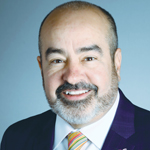
Pesquera
Miller says SSM Health's community benefit staff is increasing its attention to the local and national policy decisions that can impact population health status. Including through work with CHA, they are looking at how to affect structural, systemic change nationally in a way that can have a positive impact on the health and well-being of poor and vulnerable populations. Dircksen says Trinity Health too has increased its focus on the intersection of community benefit and community advocacy work since the pandemic began. "Local policies are super important," and so Trinity Health is looking at how to expand its political activism for policies that benefit the underserved.
The community benefit leaders say their systems' commitment to appropriately addressing community needs will not waver. They acknowledge that COVID-related economic pressures on health care systems may mean the work gets done despite resource and staff constraints.
"All of our work has been affected by COVID," says CHRISTUS Health's Pesquera, "but we will continue in that work."